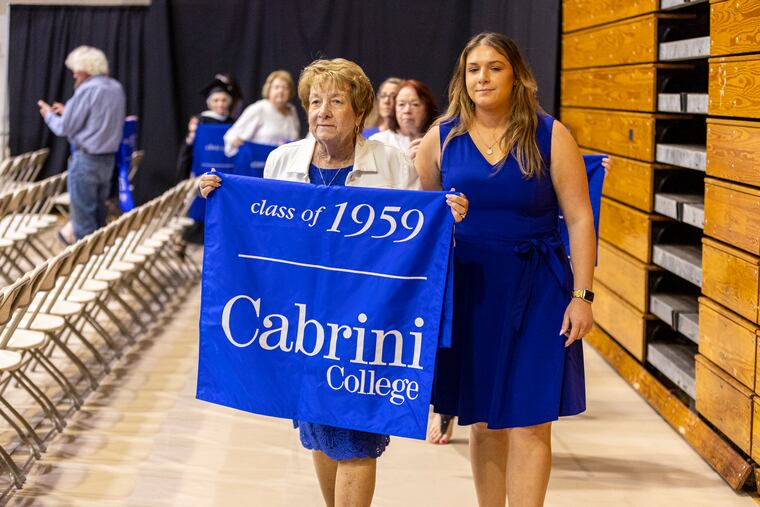Cabrini meant a lot to many people. Including me.
My parents met at Cabrini, which is closing this year. I'm not the only one who's been inspired by the place and its founder, the first canonized American saint, Mother Frances Cabrini.

As acceptance letters arrive and graduation season looms, many high school seniors are planning where they spend their college years. Sadly, one institution not accepting incoming freshmen is Cabrini University in Radnor.
Cabrini’s president, Helen Drinan, announced last year that the private Catholic school, founded in 1957 in memory of the first canonized American saint, Mother Frances Cabrini, would close at the end of this academic year. Cabrini’s 100-plus acre campus will become part of neighboring Villanova University.
Despite Villanova’s pledge to keep the Cabrini mission of social justice and advocacy alive, I wonder who will remember all that Cabrini meant to so many. I know I will.
» READ MORE: At Cabrini University, there will be no next year: A chronicling of its final semester
My parents met on the campus of Cabrini after its founding in 1957. My father was a history professor there, and my mother a chemistry instructor. Both were hired by the nun who served as Cabrini’s first president, Sister Ursula Infante, who was legendary for the energy she poured into the expansion of the campus facilities.
But the Cabrini story is much bigger than that.
The Cabrini story is much bigger.
Ironically, as the university closes its doors, many Americans are learning the story of its namesake for the first time through the film Cabrini, which recently opened nationwide.
The biopic is based on the life of Francesca Cabrini (1850-1917), an Italian woman determined to found a missionary order and to serve the Italian immigrants of turn-of-the-century New York City. She did so in a climate that was hostile to women and bigoted against Italians, both inside and outside the Catholic Church.
The movie has its fans and its detractors. For some, it’s the hackneyed saga of a saintly woman battling sexist men at every turn. For others, it’s the timeless story of women’s determination to change the world, one generous act at a time.
The script itself attributes to Mother Cabrini a very particular philosophy: Her conviction that her work in the world is to establish an “empire of hope” among the immigrants, and even the powerful, of New York City.
That is a misdirection.
Among the most notable accomplishments of Cabrini’s Missionary Sisters of the Sacred Heart of Jesus — including orphanages, public health work, and Cabrini University itself — was the daily, careworn discipline that allowed them to persist in the face of large-scale opposition and microaggressions of belittling and contempt.
To be sure, women of many faiths have been handmaidens to some questionable political projects over the centuries. But, like Mother Cabrini, when they are part of a principled, intentional, and reliable community working toward the common good, small acts of discipline can be a pathway to transformation, personal and social.
I see so many examples of women who are striving to pick up the legacy Mother Cabrini left behind.
Mariame Kaba, a grassroots activist and author of the 2021 book, We Do This ‘Til We Free Us, whose work has been focused for several decades on incarceration, violence against women and girls, and reparation law, emphasizes how important disciplined focus can be to change our society. Repurposing Mother Cabrini’s “empire of hope,” she helped to popularize the phrase “hope is a discipline.” Kaba attributes this phrase to a nun she met, who discussed what it takes to have a lifelong commitment to social justice.
In today’s Philadelphia, Sister Mary Scullion demonstrates this principle: Her work is an echo of all that Mother Cabrini believed and practiced. A member of the Sisters of Mercy, she cofounded Project HOME in 1989, a nonprofit that has served thousands of low-income people through her loving, disciplined vision of community.
The coincidence of the Cabrini film and the last graduation at Cabrini University reminds us of the discipline of hope that powered Mother Cabrini’s life’s work — and by extension, the legacy that Sister Ursula and her successors institutionalized at the university.
Hers is a practice that has the capacity for tremendous impact, in education and beyond.
Antoinette Burton is a historian, director of the Humanities Research Institute at the University of Illinois, Urbana-Champaign, and a public voices fellow with the OpEd Project. She grew up in suburban Philadelphia.